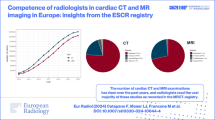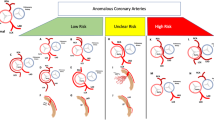Abstract
The aim of this study was to review the normal variations and anatomic pitfalls that may mimic diseases on coronary computed tomography angiography (CCTA), based on an echocardiographic correlation. Diverse normal variations and anatomic pitfalls of the heart can be misinterpreted as pathologic processes on radiologic examination. Awareness of normal variations and anatomic pitfalls during CCTA will help avoid misinterpretation of CCTA findings.


















Similar content being viewed by others
References
Hong C, Becker CR, Huber A et al (2001) ECG-gated reconstructed multi-detector row CT coronary angiography: effect of varying trigger delay on image quality. Radiology 220(3):712–717
Kim EY, Choe YH, Sung K et al (2009) Multidetector CT and MR imaging of cardiac tumors. Korean J Radiol 10(2):164–175
Broderick LS, Brooks GN, Kuhlman JE (2005) Anatomic pitfalls of the heart and pericardium. Radiographics 25(2):441–453
Halpern EJ (2008) Cardiac morphology and function. In: Halpern EJ (ed) Clinical cardiac CT: anatomy and function. Thieme, pp 146–177
Feigenbaum H, Armstrong WF, Ryan T (2005) Masses, tumors, and source of embolus. In: Feigenbaum’s echocardiography. Lippincott Williams & Wilkins, Philadelphia, pp 701–733
Gaudio C, Di Michele S, Cera M (2004) Prominent crista terminalis mimicking a right atrial mixoma: cardiac magnetic resonance aspects. Eur Rev Med Pharmacol Sci 8(4):165–168
Wong PC, Sanders SP, Jonas RA et al (1991) Pulmonary valve-moderator band distance and association with development of double-chambered right ventricle. Am J Cardiol 68(17):1681–1686
Kim E, Choe YH, Han BK et al (2007) Right ventricular fat infiltration in asymptomatic subjects: observations from ECG-gated 16-slice multidetector CT. J Comput Assist Tomogr 31(1):22–28
Gonzalez-Juanatey C, Testa A, Vidan J et al (2004) Persistent left superior vena cava draining into the coronary sinus: report of 10 cases and literature review. Clin Cardiol 27(9):515–518
Duerinckx AJ, Vanovermeire O (2008) Accessory appendages of the left atrium as seen during 64-slice coronary CT angiography. Int J Cardiovasc Imaging 24(2):215–221
Kim YY, Klein AL, Halliburton SS et al (2007) Left atrial appendage filling defects identified by multidetector computed tomography in patients undergoing radiofrequency pulmonary vein antral isolation: a comparison with transesophageal echocardiography. Am Heart J 154(6):1199–1205
Lacomis JM, Wigginton W, Fuhrman C et al (2003) Multi-detector row CT of the left atrium and pulmonary veins before radio-frequency catheter ablation for atrial fibrillation. Radiographics 23:S35–S48
Lekkerkerker JC, Jaarsma W, Cramer MJ (2005) Congenital giant aneurysm of the left atrial appendage. Heart 91(3):e21
Lichtenberg J, Briza J, Holm F (1995) Aneurysms of the left atrium and left atrial appendage. Cas Lek Cesk 134(7):207–208 [Czech]
Mathur A, Zehr KJ, Sinak LJ, Rea RF (2005) Left atrial appendage aneurysm. Ann Thorac Surg 79(4):1392–1393
Terada H, Tanaka Y, Kashima K et al (2000) Left atrial diverticulum associated with severe mitral regurgitation. Jpn Circ J 64(6):474–476
Veinot JP, Harrity PJ, Gentile F et al (1997) Anatomy of the normal left atrial appendage: a quantitative study of age-related changes in 500 autopsy hearts: implications for echocardiographic examination. Circulation 96(9):3112–3115
Harloff A, Handke M, Reinhard M et al (2006) Therapeutic strategies after examination by transesophageal echocardiography in 503 patients with ischemic stroke. Stroke 37(3):859–864
Hur J, Kim YJ, Lee HJ et al (2009) Left atrial appendage thrombi in stroke patients: detection with two-phase cardiac CT angiography versus transesophageal echocardiography. Radiology 251(3):683–690
Berkompas DC, Sagar KB (1994) Accuracy of color Doppler transesophageal echocardiography for diagnosis of patent foramen ovale. J Am Soc Echocardiogr 7(3 Pt 1):253–256
Saremi F, Channual S, Raney A et al (2008) Imaging of patent foramen ovale with 64-section multidetector CT. Radiology 249(2):483–492
Manning WJ, Waksmonski CA, Riley MF (1992) Remnant of the common pulmonary vein mistaken for a left atrial mass: clarification by transoesophageal echocardiography. Br Heart J 68(1):4–5
Oh JK, Seward JB, Tajik AJ (1999) Appendix. In: The echo manual. Lippincott Williams & Wilkins, Philadelphia, pp 257–265
Baosheng G, Jun Y, Xiaona Y et al (2009) Left ventricular apical thin point viewed with two-dimensional echocardiography. Echocardiography 26(8):988–990
Bradfield JW, Beck G, Vecht RJ (1977) Left ventricular apical thin point. Br Heart J 39(7):806–809
Johnson KM, Johnson HE, Dowe DA (2009) Left ventricular apical thinning as normal anatomy. J Comput Assist Tomogr 33(3):334–337
Keren A, Billingham ME, Popp RL (1984) Echocardiographic recognition and implications of ventricular hypertrophic trabeculations and aberrant bands. Circulation 70(5):836–842
Boyd MT, Seward JB, Tajik AJ et al (1987) Frequency and location of prominent left ventricular trabeculations at autopsy in 474 normal human hearts: implications for evaluation of mural thrombi by two-dimensional echocardiography. J Am Coll Cardiol 9(2):323–326
Sedmera D, Pexieder T, Vuillemin M et al (2000) Developmental patterning of the myocardium. Anat Rec 258(4):319–337
Tamborini G, Pepi M, Celeste F et al (2004) Incidence and characteristics of left ventricular false tendons and trabeculations in the normal and pathologic heart by second harmonic echocardiography. J Am Soc Echocardiogr 17(4):367–374
Alhabshan F, Smallhorn JF, Golding F et al (2005) Extent of myocardial non-compaction: comparison between MRI and echocardiographic evaluation. Pediatr Radiol 35(11):1147–1151
Oechslin EN, Attenhofer Jost CH, Rojas JR et al (2000) Long-term follow-up of 34 adults with isolated left ventricular noncompaction: a distinct cardiomyopathy with poor prognosis. J Am Coll Cardiol 36(2):493–500
Ritter M, Oechslin E, Sütsch G et al (1997) Isolated noncompaction of the myocardium in adults. Mayo Clin Proc 72(1):26–31
Petersen SE, Selvanayagam JB, Wiesmann F et al (2005) Left ventricular non-compaction: insights from cardiovascular magnetic resonance imaging. J Am Coll Cardiol 46(1):101–105
Luetmer PH, Edwards WD, Seward JB et al (1986) Incidence and distribution of left ventricular false tendons: an autopsy study of 483 normal human hearts. J Am Coll Cardiol 8(1):179–183
Mattioli AV, Aquilina M, Oldani A et al (2001) Atrial septal aneurysm as a cardioembolic source in adult patients with stroke and normal carotid arteries. A multicentre study. Eur Heart J 22(3):261–268
Gaerte SC, Meyer CA, Winer-Muram HT et al (2002) Fat-containing lesions of the chest. Radiographics 22:S61–S78
Meaney JF, Kazerooni EA, Jamadar DA et al (1997) CT appearance of lipomatous hypertrophy of the interatrial septum. AJR Am J Roentgenol 168(4):1081–1084
Zeebregts CJ, Hensens AG, Timmermans J et al (1997) Lipomatous hypertrophy of the interatrial septum: indication for surgery? Eur J Cardiothorac Surg 11(4):785–787
Choi YW, McAdams HP, Jeon SC et al (2000) The “High-Riding” superior pericardial recess: CT findings. AJR Am J Roentgenol 175(4):1025–1028
Glazer HS, Siegel MJ, Sagel SS (1989) Low-attenuation mediastinal masses on CT. AJR Am J Roentgenol 152(6):1173–1177
Author information
Authors and Affiliations
Corresponding author
Rights and permissions
About this article
Cite this article
Kim, E.Y., Park, J.H., Choe, Y.H. et al. Normal variations and anatomic pitfalls that may mimic diseases on coronary CT angiography. Int J Cardiovasc Imaging 26 (Suppl 2), 281–294 (2010). https://doi.org/10.1007/s10554-010-9707-z
Received:
Accepted:
Published:
Issue Date:
DOI: https://doi.org/10.1007/s10554-010-9707-z




